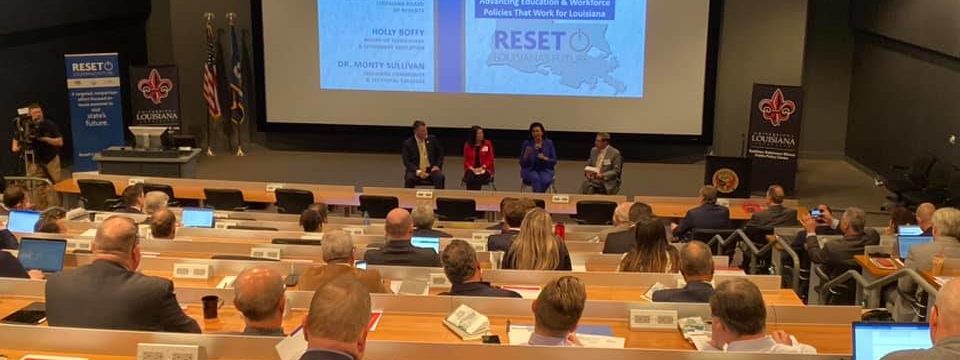
The 2020 legislative session begins on Monday and in many ways it will be a new day at the Capitol as term limits usher in a host of new members, and leaders in both chambers signal that they will be seeking a more independent role in the governing process.
A number of those points were made this week at a legislative conference focusing on the RESET Louisiana agenda held in conjunction with the Blanco Public Policy Center at the University of Louisiana, Lafayette. RESET is a joint initiative of CABL, the Public Affairs Research Council, and the Committee of 100 for Economic Development to focus on issues of importance to Louisiana.
Senate President Page Cortez and House Speaker Pro Temp Tanner Magee were among the legislators in attendance. Both stressed their desire to see the House and Senate working more closely together in a coordinated fashion to move legislation through the process. In recent years, the two chambers were often at odds over money matters. Both leaders talked of striking a better balance on the budget and working more cooperatively together on issues as a whole.
There were four major issue areas in the RESET agenda: education and workforce, state fiscal policies, transportation infrastructure, and criminal justice reform.
For the 2020 session, it appears it’s another issue, “tort reform,” that will likely be the most prominent matter debated, as a number of legislators campaigned on it. But of the RESET items, it looks like education and criminal justice reform will get the most attention.
The governor’s budget calls for increased spending on early education for children birth to age three, K-12 education as a whole, and postsecondary education. Much of that new investment is targeted to areas that were prominent in the RESET agenda.
On criminal justice there is legislation to continue the implementation of reforms passed in 2017, as well as bills to water down some of those efforts. CABL will work to keep the reform process moving forward.
Most of the big issues involving state fiscal policies and transportation will have to wait until next year, when they can be addressed more fully in a fiscal session. But there will be some activity on each of them in 2020. Bills have been introduced to move toward a single tax collector for sales taxes. Louisiana is a huge outlier on that one with a patchwork of tax collectors and differing sales tax rates in jurisdictions across the state.
On transportation, some lawmakers are looking at ways to either divert revenues from other sources into the Transportation Trust Fund, or take some administrative expenses from DOTD out of the fund to free up more money for infrastructure projects. Both of those could face difficulties because of the impact they would have on other parts of the budget.
But one thing that emerged from the RESET conference in Lafayette is that there is a willingness and desire to begin to address many of the RESET issues, if not all this year, at least during the current term. Legislative leaders indicated strong support for improving the state’s tax structure and putting more resources into roads, bridges, and other transportation projects.
Things can change quickly once sessions begin, but we are encouraged by the attention legislators are giving to the RESET issues, and hope this year marks the beginning of a legislative focus on the things that will truly help move Louisiana forward.
